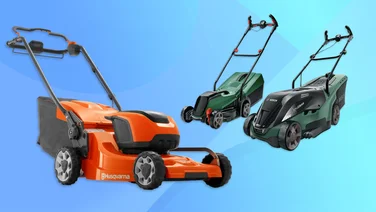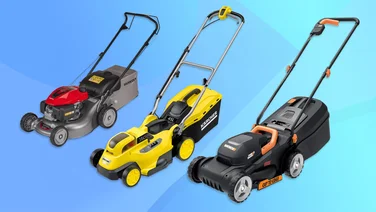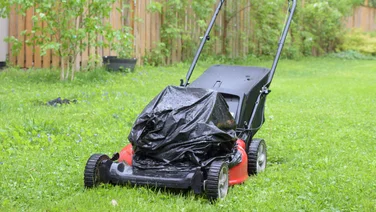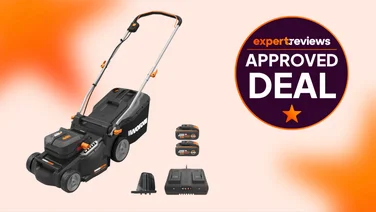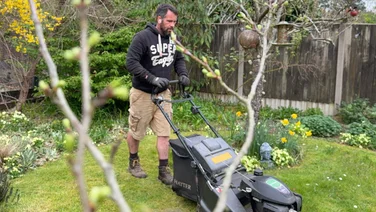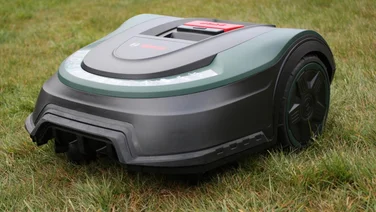To help us provide you with free impartial advice, we may earn a commission if you buy through links on our site. Learn more








- Affordable price
- Drop and mow
- Avoids anything that’s not lawn
- Not great at edges
- Fooled by patchy lawns
- No object avoidance
If you’ve ever been put off buying a robot lawnmower because of the requirement to set up perimeter wiring and install an outdoor charging station, then the LawnMaster VBRM16 could be the answer to all your prayers. Of all the top robot lawn mowers we’ve tested, this is one of the easiest to use.
LawnMaster advertises the VBRM16 as a ‘drop and go’ mower. If your lawn’s borders conform to LawnMaster’s guidelines, you can simply plonk it down and set it off. There’s no need for any kind of wiring and the battery can be charged in your garage or kitchen. Compared to laying and pegging a guide wire and connecting the whole caboodle to an outdoor power socket, the VBRM16 is extraordinarily simple.
LawnMaster VBRM16 review: What do you get for the money?
You might think that such an autonomous-sounding robot lawnmower must cost a penny or two. Few robot lawnmowers can be described as cheap but, at an RRP of £349, this small robot is more affordable than most.
Some of this comes from the comparatively sparse box. Where most robots are supplied with charging stations, pegs and rolls of boundary wire, the VBRM16’s accessories are minimal. There is a charger for the battery but it’s a standalone device about the size of a tub of margarine, which can be stored anywhere and plugged in as needed. The removable battery is also in the box and needs charging before the mower’s first use.
The mower itself is relatively compact, measuring 425 x 350 x 220mm (WDH). It weighs 6.6kg (including the battery) and has a carrying handle attached to the top. This is useful, because it doesn’t park itself in the garden like most robot mowers. Instead, when it’s finished mowing, you have to stop it mowing manually by pressing the large button on the top and removing the isolator key from the compartment at the back. It can then be stored in a shed or garage.








The cutting mechanism on the base of the device is a wheel that rotates horizontally, with a trio of razor-like blades attached to its perimeter. This gives it a cutting width of 16cm, which is fairly small compared to rivals that can go up to 19cm. Because of this, and because the mower is compact and self-sufficient, LawnMaster suggests it should be limited to small gardens of around 100m2.
READ NEXT: The best cordless lawn mowers
LawnMaster VBRM16 review: Is it difficult to set up?
Perhaps the best thing about the LawnMaster VBRM16 is that there is no laborious setup required. This is revolutionary, with no boundary wire to lay, no charging station to pin to the lawn and no need to have an outdoor power supply to plug it in.








Instead, when you first get the robot, you only need to charge the removable battery using the separate charging unit. It comes partially charged and I found it was fully charged within 30 minutes. Remove it from the charger and slot it into the cavity on the rear of the mower, and it’s good to go. The battery should last around three hours and only takes an hour to charge from empty.
Grabbing it by the handle, I plonked it on my lawn, pressed two buttons, and the mower was off and mowing.
READ NEXT: Best lawn mower for a small garden
LawnMaster VBRM16 review: How well does it mow the lawn?
My lawn has a variety of boundary edges. At the back there’s a drop to a sunken gravel path. To the right, paving slabs edge the lawn, sunk into the earth at lawn level. The front of the lawn butts up to a patio, which is raised about 15cm above the lawn height. Lastly, the left side is a simple dropped border into a flower bed.
The robot uses a camera to detect grass on the lawn ahead of it. If the grass stops and the mower detects a different surface, it will stop, turn around, and head off in a different direction.
As a result, it was the bed on the left that I was most concerned about. The mower could do little damage to my other edges if it failed to notice the lack of grass. On the left, however, it’s a short hop from the lawn to some of my wife’s favourite plants.
There’s a list of compatible borders in the manual, and a short drop to a flowerbed isn’t included, but I decided to risk it anyway. I wasn’t disappointed. The mower stopped and turned back at all my borders, even the tricky ones. I suspect it’s programmed to err on the side of caution, since a mistake could be catastrophic.








If you’re a little less laissez-faire you may need to lay a raised lawn border along any worrying beds. The manual suggests this should be at least 6cm high, and it needs to be solid enough to stop the mower as it bumps into it.
The downside of the LawnMaster VBRM16’s unwillingness to traverse anything that isn’t grass is that it wasn’t brilliant around bare patches. I have a fairy ring in my grass that fared particularly badly over the hot summer of 2022 and hasn’t managed to recover, leaving bare patches in the lawn. When the mower approached these, it stopped and avoided them. If it was a flower bed I’d be thankful for it but it’s worth noting that the patchier your lawn, the harder it will be for the Lawnmaster VBRM16 to navigate it successfully.
Unfortunately, the same problem applies to patches scorched by dog pee. I’ve spent the winter toilet-training a puppy and the VBRM16 ended up spending quite a bit of time stuck in the corner of my lawn the dog seems to have favoured, bouncing between patches of scorched grass.








There are two cutting programs on the mower, both selectable using controls on the device itself. The standard “Auto Cutting” setting is a random program that simply turns the mower by a random angle when it hits what it thinks is a border. Because of this, mowing your lawn is going to be a little random, although as long as it’s small, the mower should cover the whole area reasonably quickly.
The other option is “Spot Cutting”. Here, the mower moves in a spiral from the spot where you drop it, mowing as it goes until it’s covered an area of around 2m2. If it hits a border or gets to the end of its spiral, it switches to Auto Cutting mode and starts mowing randomly. This is useful, because it gives you the option of dropping the mower on a section that doesn’t appear to have been mowed that well last time, and to start the mowing from there.
Unlike most robot mowers, the Lawnmaster VBRM16 has no smartphone app and no timer to send the robot out automatically. Instead, it’s designed to be manually switched off when it’s finished and stored indoors. It’s a simple but effective system but you do have to get the mower out each time you want to mow, where many rivals will work in the background for weeks without any manual intervention.
The one area it doesn’t cope well with is edges. Few robot mowers will get their blades close enough to your borders to mean that you’ll never have to bring out your regular mower or trimmer to whizz around the edge but by only nosing in and traversing back out again, this model’s edging is particularly scrappy.
READ NEXT: Best ride-on lawn mower
LawnMaster VBRM16 review: Should you buy it?
The LawnMaster VBRM16 is certainly not the most advanced robot lawnmower you’ll come across. However, if you’re looking for a model that can start cutting your lawn on the day you get it, with no requirement to install wires or connect a base station, it’s a simple and effective machine.
It’s possibly better aimed at those with a small garden looking for an easy life, rather than anyone wanting a perfect lawn. No robot mower is good at creating neat edges up to every type of boundary but this model won’t even do a perimeter lap to straighten everything off. I really appreciated the ease with which it gets up and running, though.
Those looking for neater edges will be better served by the Worx Landroid M500 Plus WR165E. This needs perimeter wire and a base station to be installed but its off-set blade is capable of cutting as close to the edge of the grass as a robot mower can safely be allowed. Its cutting schedule can be controlled by a smartphone app and it can manage a lawn of up to 500m2.
If you’d prefer not to have your lawn subjected to the constant to and fro of a random mower, then the Bosch Indego S+ 500 is a best choice. This creates a map of your lawn, then mows it section by section, ensuring that no corners are left unmowed. It is quite expensive, unfortunately.


